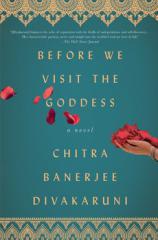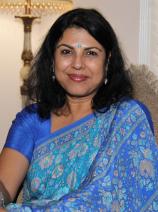Author Talk: April 20, 2016
Chitra Banerjee Divakaruni is the award-winning author of numerous books, including THE PALACE OF ILLUSIONS, ONE AMAZING THING and OLEANDER GIRL. Her latest novel, BEFORE WE VISIT THE GODDESS, sweeps across the 20th century from the countryside of Bengal to the streets of Houston, exploring the complex relationships between mothers and daughters, and the different kinds of love that bind us across generations. In this interview, Divakaruni discusses the various elements that inspired GODDESS --- including books by other authors, cultural mythology and personal experiences --- as well as the themes she seems to return to, intentionally or not, again and again in her work.
Question: Why did you decide to begin BEFORE WE VISIT THE GODDESS with epigraphs from Manusmriti and Jean Thompson? Was it important to have both Hindu and Western quotes?
Chitra Banerjee Divakaruni: Yes, it was important to me to have quotes from both cultures because the book, in my mind, straddles India and America. The Manusmriti quote is ironic social commentary as well as a hope. Manu says that where women are respected, the gods are pleased. This is clearly not always so in the world of the novel. The Thompson quote points to the hidden life of the individual, secrets we keep close to our own hearts. This is thematically important throughout the novel.
Q: On page 42, Sabitri inadvertently mixes up “stay” and “stray” during her recitation of part of “The Lady of Shalott.” What other literary sources inspired the novel?
CBD: This novel has been inspired by so many books. Louise Erdrich’s LOVE MEDICINE was a major influence. I have long loved those connected tales that create for us a culture and a community. I am also influenced by the works of Amitav Ghosh and Maxine Hong Kingston. They achieve so wonderfully the portrayal of a world, a culture and the human heart. These are all endeavors of mine in this novel.
The structure of this novel has been inspired by books such as Jennifer Egan’s A VISIT FROM THE GOON SQUAD, which moves back and forth in time. This was important for me because I wanted to find emotional connections between events, not necessarily only chronological ones.
Q: Your book is about the relationships between three generations of women, yet you end the last generation with a son. What was the reasoning behind ending the cycle of female offspring?
CBD: That’s just how things happen sometimes! It seemed realistic. But also, with Tara, the cycle of immigration has come to an end, and perhaps this parent-child relationship is therefore going to be a very different one. Tara’s relationship with her husband is also very different from what her grandmother and mother experienced.
Q: Mother-daughter relationships are at the heart of this book. What was your relationship with your mother like growing up? Is any of it reflected in the book?
CBD: Mother-daughter relationships have been important to me for a long time. Novels like SISTER OF MY HEART, QUEEN OF DREAMS and OLEANDER GIRL all feature significant mother-daughter relationships. My own relationship with my mother was multifaceted, often tempestuous. She was, essentially, a single parent. This made her very strict toward her children because we lived in a society where it was difficult for a woman to be the head of a household. We kept many secrets from each other. It was only after I became a mother myself that our relationship improved, and we became very close. It was only then that I realized how many hardships she had gone through to raise me and give me an education. Looking back, I thank my mother for having forced me to become a strong individual and make the most of myself.
Q: All of the chapters in BEFORE WE VISIT THE GODDESS are from the point of view of either the three main women or the men in their lives, save those that feature Dr. Venkatachalapathi and Kenneth, who are really outsiders to the story. Why use a relative stranger to show Bela’s immediate experiences post-divorce and Tara’s life after her abortion?
CBD: Although Dr. Venkatachalapathi and Kenneth enter the book relatively briefly, they are very important to the women with whom they have meaningful interactions, especially at a time when each woman is feeling alone, hopeless and adrift. Through them, I also wanted to bring up the theme that one can never know who is going to help you turn your life around, or how they will do it. And bonds of the heart do not necessarily depend on the amount of time we spend with each other. There have been people in my life whom I met only once, or perhaps even only read their books, and they have had an enormous influence on me.
Q: Your book has many unfolding layers, and on page 104 you have Bela narrate that “you could be acquainted with a person for years, thinking you knew them. Then suddenly they’d do something that showed you there were layers to them you hadn’t ever suspected.” Which of the story lines was your favorite to tease out?
CBD: Actually, all of them were fascinating to me. When I began the book, I did not necessarily know how the lives of each of the major characters would turn out or the paths they would take to get there. The writing was a process of discovery for me. And even when I was revising the book, I was seeing new connections and putting them in. For instance, the phone call Tara makes the night before she gets the abortion shows up in a much later story. This was a detail I added almost at the end of my revision process, but I believe it made the situation a much more ironic one.
Q: Cooking is a very personal experience for Bela and Sabitri, but less so for Tara. Which end of the spectrum do you fall on?
CBD: I love to cook --- but sporadically, when I get in the mood. Usually, I’m like Tara --- from chopping board to dining table in 30 minutes flat! I like easy dishes and shortcuts to classic Indian cuisine. I’ve put a bunch of recipes up on my blog. Here’s one that relates to BEFORE WE VISIT THE GODDESS.
Q: What were the origins of BEFORE WE VISIT THE GODDESS? Did you have any characters or story lines picked out first that you began writing before the others?
CBD: I think the story of Sabitri was the clearest to me --- not so much her death but her early years as a poor student living in the affluent Mittir household. I love the old mansions of Kolkata. I imagined that house very clearly, before I imagined anything else in the novel. Old houses also feature in some of my other books --- OLEANDER GIRL and “The Maid Servant’s Story” in ARRANGED MARRIAGE, for instance.
Q: At this point in your career, your written output is considerable. What themes and characterizations do you see yourself inadvertently returning to again and again?
CBD: I am fascinated by relationships among women, the intercultural experience of India in America, parent-child relationships, love and its fallout, and American life (one of the chapters in this novel has that for a title). I am also very attracted to mythological stories and often weave them into my work. My novel THE PALACE OF ILLUSIONS is a retelling of the Indian epic the Mahabharat.




